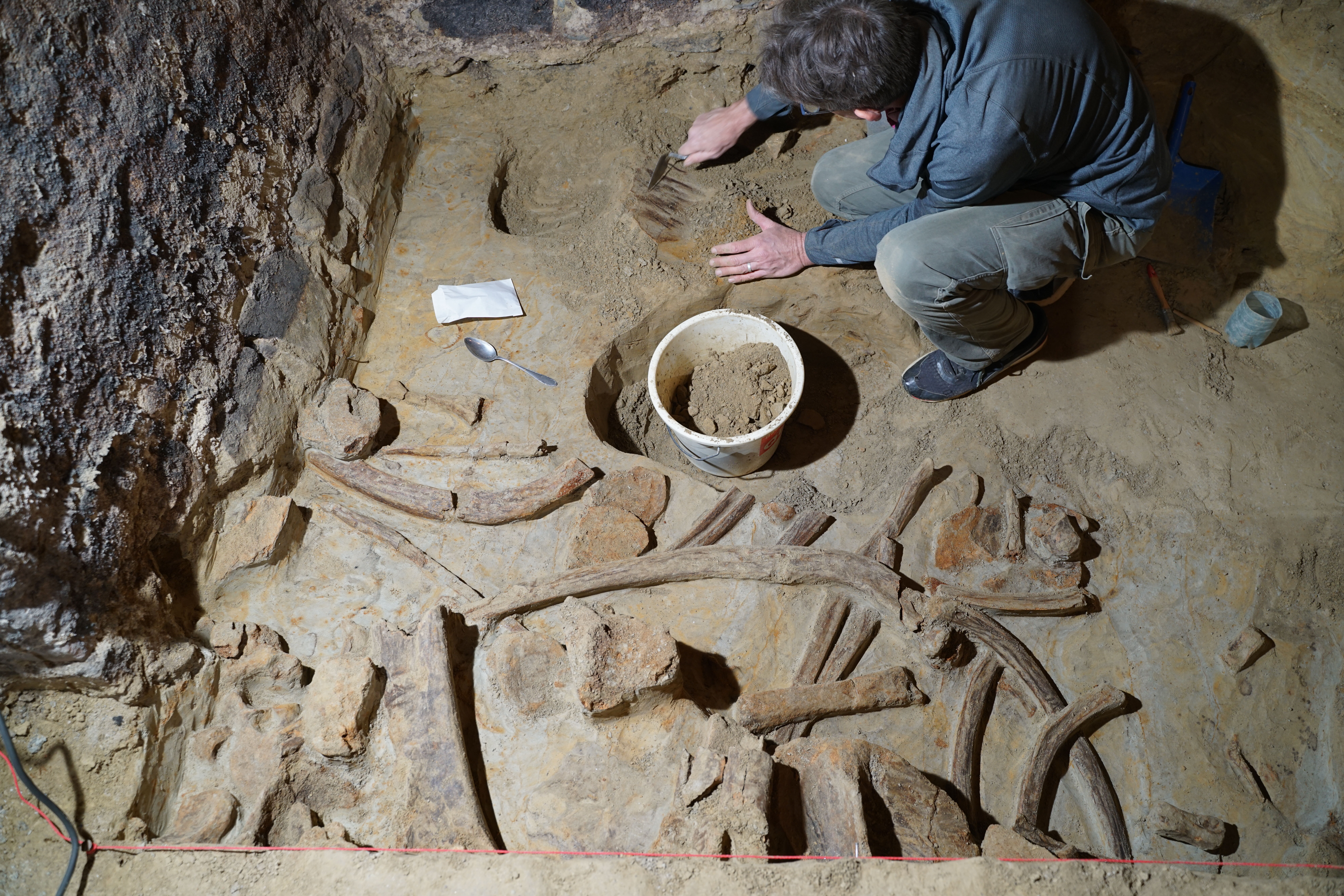Animals
Eerie Lampreys Hint at the Origins of Our 'Fight-or-Flight' Response and Sympathetic Nervous System
The jawless, parasitic fish largely haven't changed over the last 340 million years, but they might be better sources for studying our own evolution than thought, a recent study suggests
Crows Can 'Count' Up to Four Like Human Toddlers, Study Suggests
Three carrion crows engaged in a simplified version of counting when prompted, and the birds showed signs of planning out their responses
Giant Pandas Are Coming Back to Washington, D.C.
A pair of the bears will arrive at the Smithsonian's National Zoo by the end of 2024
Wild Dogs Have Muscles for 'Puppy Eyes,' Suggesting the Cute Expression Did Not Evolve Just for Humans
African wild dogs have the same well-developed eye muscles that domestic dogs use to make their signature pleading faces, a recent study finds
Letters Written by Ancient Roman Commanders Have Been Found in a Pet Cemetery in Egypt
Discovered among the graves of hundreds of cats, dogs and monkeys, the correspondence was likely written by centurions in the first century
Imperiled Eagles Are Altering Their Migration Routes to Avoid the War in Ukraine
Researchers found that greater spotted eagles migrated longer distances and made fewer rest stops following Russia's invasion of Ukraine in 2022, compared to previous years
A New Airline for Dogs Takes Flight
Bark Air made its inaugural flight from New York and Los Angeles this week. But seats are pricey, costing up to $8,000
Austrian Man Discovers Hundreds of Mammoth Bones While Renovating His Wine Cellar
Owner Andreas Pernerstorfer thought he'd found a piece of wood, but then he remembered something his grandfather had said about finding teeth in the cellar decades ago
Celebrate World Turtle Day With 15 Photographs of the Delightful Reptiles
These shots from the Smithsonian Magazine Photo contest show why turtles are so terrific
Mexico's Howler Monkeys Are Dying, 'Falling Out of the Trees,' Amid Scorching Heat Wave
Veterinarians and volunteers are trying to save the threatened primates by hoisting buckets of water and food into trees, as well as providing medical care
DNA Reveals How German Cockroaches Came to Dominate the World
A new paper looks at the genes of the most common cockroach species, tracing its historical journey alongside humans, from Asia to the Middle East, Europe and beyond
Beachcombers Discover Rare, Deep-Sea Anglerfish Washed Up on Oregon Coast
Most humans will never see a Pacific footballfish, as the creatures live at depths of 2,000 to 3,300 feet below the ocean's surface
Why Is Chinese Art Full of Dragons, Phoenixes and Tigers?
A new exhibition showcases stunning mythical artworks of the Zhou Dynasty's "lost" kingdoms
Why Are Tuna Crabs Swarming Off the Coast of San Diego?
Scientists are perplexed by the massive group of crustaceans, but they suspect the animals were pushed north by strong ocean currents originating near Mexico
Get a Taste of South Africa Through These 15 Photos of Stunning Wildlife and Vibrant Communities
From desert landscapes to glittering beaches, see what this country has to offer
Some Dinosaurs Evolved to Be Warm-Blooded 180 Million Years Ago, Study Suggests
Researchers studied the geographic distribution of dinosaurs to draw conclusions about whether they could regulate their internal temperatures
Orcas Sink 50-Foot Yacht Off the Coast of Morocco
The vessel's two passengers were evacuated onto an oil tanker in the Strait of Gibraltar. The incident marks the fifth vessel the mammals have sunk in recent years
Earth's Magnetic Field Nearly Collapsed 600 Million Years Ago. Then, Weird and Complex Life Evolved
A new study suggests more solar radiation reached Earth while the magnetic field weakened, leading to a rise in oxygen that drove an explosion of multicellular organisms during the Ediacaran Period
How Do Elephants Say Hello? Reunions Lead to Ear Flapping, Rumbling and Trunk Swinging in Greeting
New research explores how African savannah elephants use vocalizations, gestures and secretions when they meet up with companions
Biodiversity Loss Increases the Risk of Disease Outbreaks, Analysis Suggests
Researchers found that human-caused environmental changes are driving the severity and prevalence of disease, putting people, animals and plants at risk
Page 11 of 190
:focal(720x370:721x371)/https://tf-cmsv2-smithsonianmag-media.s3.amazonaws.com/filer_public/ac/ba/acbaba09-a0cf-4a4b-b584-4a725bd28d65/marianne_bronner-evolution_o2e16d0bafill-1600x810-c100.jpg)
:focal(1685x1171:1686x1172)/https://tf-cmsv2-smithsonianmag-media.s3.amazonaws.com/filer_public/11/22/11228101-b1b2-4366-b675-f7f8d566f262/51984109685_632ca93abb_o.jpg)
:focal(700x527:701x528)/https://tf-cmsv2-smithsonianmag-media.s3.amazonaws.com/filer_public/5d/80/5d80eea0-5335-4783-a118-5f6e1d36d8dc/bao-li.jpg)
:focal(512x356:513x357)/https://tf-cmsv2-smithsonianmag-media.s3.amazonaws.com/filer_public/fb/35/fb35df5c-122e-4314-bbea-f714ff267340/5689911466_f891b39916_o.jpg)
:focal(800x602:801x603)/https://tf-cmsv2-smithsonianmag-media.s3.amazonaws.com/filer_public/f9/c4/f9c43e47-72e6-4f99-ad2b-62582f0a8e3c/dscn9562.jpeg)
:focal(1750x1183:1751x1184)/https://tf-cmsv2-smithsonianmag-media.s3.amazonaws.com/filer_public/77/06/77061410-4d70-4b21-b1f2-7d5e6c7de085/gettyimages-976321594.jpg)
:focal(500x336:501x337)/https://tf-cmsv2-smithsonianmag-media.s3.amazonaws.com/filer_public/63/59/63596efc-ab88-478b-a144-54d776414247/jgal0029-copy.png)

:focal(2958x1972:2959x1973)/https://tf-cmsv2-smithsonianmag-media.s3.amazonaws.com/filer_public/9d/ab/9dabc2bf-1952-4da1-962b-d4e56369f50d/ee68db07-5313-4a94-8e88-84d88ada2fc8.jpg)
:focal(1337x904:1338x905)/https://tf-cmsv2-smithsonianmag-media.s3.amazonaws.com/filer_public/37/e5/37e564b0-b733-492c-a5e2-fee66c0d3e78/gettyimages-2153383393.jpg)
:focal(2141x1478:2142x1479)/https://tf-cmsv2-smithsonianmag-media.s3.amazonaws.com/filer_public/e9/d0/e9d0f27c-6f42-4764-bdd3-036702fb6fdb/gettyimages-548129767.jpg)
:focal(768x768:769x769)/https://tf-cmsv2-smithsonianmag-media.s3.amazonaws.com/filer_public/e7/40/e74052dc-0446-4973-8643-c5c483cac89e/442472323_843329167833870_7554554309933957287_n.jpg)
:focal(600x451:601x452)/https://tf-cmsv2-smithsonianmag-media.s3.amazonaws.com/filer_public/b7/f7/b7f71b32-5edf-4fab-b913-bb3e0a3a4dc7/phoenix_drum_1.jpeg)
:focal(1500x900:1501x901)/https://tf-cmsv2-smithsonianmag-media.s3.amazonaws.com/filer_public/0d/9f/0d9f6edd-8639-422a-bbcd-a66afe1dae80/gettyimages-1540446.jpg)
:focal(1200x903:1201x904)/https://tf-cmsv2-smithsonianmag-media.s3.amazonaws.com/filer_public/e7/31/e7312d75-0aa3-49af-a029-12102cc22222/1-opener.jpg)
:focal(384x241:385x242)/https://tf-cmsv2-smithsonianmag-media.s3.amazonaws.com/filer_public/9f/ec/9fec1bc6-f957-41bd-a805-6c5e5458aa08/dromaeosaur_in_the_snow_by_davide_bonadonna_squared_-_hd_cropped_again.jpg)
:focal(2550x1591:2551x1592)/https://tf-cmsv2-smithsonianmag-media.s3.amazonaws.com/filer_public/bb/86/bb862a6b-11d3-43d1-aa5a-860f62343f1f/gettyimages-639203690.jpg)
:focal(1051x596:1052x597)/https://tf-cmsv2-smithsonianmag-media.s3.amazonaws.com/filer_public/e1/77/e177f56b-d64c-4ccd-81a6-32651b97006b/screenshot_2024-05-15_at_104513_am.png)
:focal(1702x1507:1703x1508)/https://tf-cmsv2-smithsonianmag-media.s3.amazonaws.com/filer_public/20/97/20976dde-a5a3-43d7-8102-3aac5af6b4c1/image-5.jpg)
:focal(2592x1728:2593x1729)/https://tf-cmsv2-smithsonianmag-media.s3.amazonaws.com/filer_public/38/46/38465717-3e22-445d-843a-f856aadc66df/52397782341_45c7eb2ef3_o.jpg)